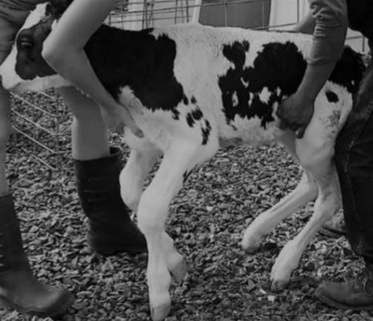The scientific community has recently identified a new genetic condition in the Holstein breed, named Calf Recumbency also called Onset Muscle Weakness Syndrome – MW (early muscle weakness).
What is Calf Recumbency
This genetic condition is identified as a generalized inability of the calf to maintain the standing position. The MW does not allow individuals to survive beyond 6 weeks of age. This defect may occur at birth or appear in the first few days of the calf’s life, as a loss of the ability to stand.
From a genetic point of view, Calf Recumbency is an anomaly that involves a recent mutation within the CACNA1S gene on chromosome 16. The gene helps create skeletal muscles calcium channels. Its mutation causes a slowing of the calcium flow in muscle cells during the contraction, resulting in motor difficulties in the calf.
Calf Recumbency in Holstein population
The frequency of Calf Recumbency has increased significantly since 2010: its increased from less than 5% up to 11% of the total amount of the genotypized female Holstein pupulation.
The test for this genetic condition is now available and, from the first results, some A.I. bulls have been identified as MW carriers. The origin of the mutation is attributed to Southwind Bell of Bar-Lee, a bull from 1984. Also Supersire is mentioned as one of the most important carrier in the last decade.
However, the expression of this genetic defect is characterized by incomplete penetrance, which means that not all carriers manifest the problem (a characteristic of numerous genetic diseases).

Next steps
Today, there are some reliable tests that allow to check the Holstein population.
Mating plans will increasingly play an important role in order to reducing genetic anomalies. In addition, it will be possible to test young bulls, in order to exclude them from the Selection Programs as it has already been done in the past with all the genetic defects.
On the other hand, the important role of the breeder will be to report and document any calves affected by Calf Recumbency in order to collect valuable informations that will help manage this genetic defect correctly.
Intermizoo’s next steps
Starting from August 2023 catalog, Intermizoo has already tested all the A.I. bulls and published the results,.
Currently, only 3% of active Intermizoo bulls are carriers: a result well below the population average of A.I. bulls.
The information can be consulted in the bull card, catalog, website, and lists published below (updated September 2023).
For further infos:
Identification of a putative haplotype associated with recumbency in Holstein calves.
C.D. Dechow 1, E. Frye 2, F.P. Maaunsell 3

